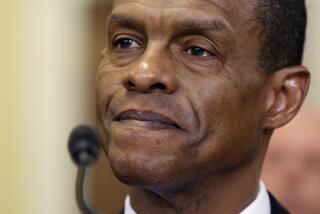Soviet Cop Says <i> Nyet</i> With a Wink : Vadim Bakatin shuns key posts but still appears on his way to the top.
- Share via
MOSCOW — It is not his fault that he keeps getting nominated for lofty jobs, Vadim V. Bakatin said gruffly--and maybe a bit sheepishly.
The nation’s top cop suffers from such persistent popularity that, against his will, he has been proposed five times in the past year for top state and party posts, including the presidency of the Soviet Union and the leadership of the Communist Party.
He has withdrawn every time.
“I don’t know who nominated me,” the interior minister told a roomful of reporters recently. “It was just, ‘All right, it’s Comrade Bakatin.’ No one consulted with me, no one spoke with me on this.
“I don’t know how life will develop. I can’t say in advance that this is it, that I’ll end my days with the police. The devil knows how all this will end. I don’t know--but the process shouldn’t be so sporadic.”
Bakatin’s disavowals conformed to Russian political etiquette, under which a would-be candidate must never look as if he really wants a post for fear of being branded “ambitious.” But they did not ring completely true.
Reluctant or not, Bakatin, 52, looks like he is still on his way up, if only because personable, nationally known-and-liked politicians are in such great shortage. Some speculation holds he has a good chance to become prime minister if incumbent Nikolai I. Ryzhkov succumbs to the criticism of his government’s sluggish economic reforms and resigns.
“As a more decisive person than Ryzhkov, it’s quite probable he could pretend to the post of prime minister,” Vitaly Tretyakov, political observer for the weekly Moscow News, said of Bakatin. “It’s indicative that even though he’s interior minister, not one of the most pleasant positions, he still has great sympathy among the people.”
Bakatin’s surface appeal is obvious. Tall and blue-eyed, with high cheekbones and a decided resemblance to ABC anchorman Peter Jennings, he cultivates a decisive, impatient style that includes an occasional spate of light fist-banging.
The Siberian’s speaking manner recalls Mikhail S. Gorbachev’s. He lacks the Soviet president’s soft southern pronunciation and iffy grammar but has the same amazing fluency with political rhetoric and the same tendency to switch suddenly from calm analysis to heated emotion.
In the Soviet political arena, Bakatin is seen as a typical member of Gorbachev’s team, a veteran party official who worked under the old system long enough to understand it but who is now pushing full force for reform. He holds a place on the Presidential Council, the top advisory body largely handpicked by Gorbachev.
Gorbachev brought Bakatin to Moscow as interior minister two years ago, even though he had no background in police work, and the former civil engineer has continued the cleanup of what had become one of the country’s most corrupt ministries.
He also introduced striking openness in the ministry, regularly briefing the media about the frightening jump in Soviet crime--about 30% in each of the last two years--and the seeming inability of the police to reverse the trend.
Instead of falling into the pattern, common among Soviet conservatives, of blaming the crime rate on a new permissiveness, Bakatin speaks proudly of his mission to create a working criminal justice system in a freer society.
“It would be the height of idiocy to think that crime is growing because democracy is growing,” he said in an interview in his paneled, red-carpeted office.
“When we had a kind of totalitarian system, far from the ideals of a democratic state, we could cope more simply, suppress these phenomena more simply,” Bakatin said. “Now, it’s impossible to do it simply, it’s done only in the framework of the law, a humane, just, democratic law, and so this whole system must be created.
“It didn’t exist before. It wasn’t needed. What does a totalitarian system need with a strong law enforcement system? It needs a strong punitive system, not a strong law enforcement system. So this is all being created now.”
Bakatin said that the solution to the rising crime rate is not less democracy but more money for the police to pay higher salaries and buy better equipment.
The father of two sons and reputedly a talented amateur painter, Bakatin first gained a national audience at the Communist Party conference in June, 1988. Then the party chief of his native Kemerovo coal-mining region in Western Siberia, he called for government ministries to relinquish much of their control over mining.
That same call was one of the key demands miners made in strikes that swept the country a year later.
Gorbachev brought Bakatin to Moscow for the Interior Ministry post soon after the party conference, and he set to work on radical changes, right down to depriving more than 1,000 top officials of the sirens and flashing blue lights on their shiny black cars.
Bakatin acknowledged that, despite his reforms, ministry performance remains poor, and said a recent survey found that only 8% of the Soviet population think the police do a good job.
But worries about the police are not his biggest problem. As head of the nation’s internal security forces, estimated to total 385,000, he is also responsible for quelling the ethnic unrest that has plagued his two-year tenure, mainly in the southern Soviet Union.
“Mass disorders that turn into pogroms, murder and rape with an enormous number of victims--that’s the situation that is hardest for us to deal with,” he said.
Tretyakov, of Moscow News, commented in an interview that ethnic fighting could also prove Bakatin’s undoing. If he makes a wrong move with his troops and unneeded bloodshed results, that could be his end politically, Tretyakov said.
Bakatin has already come through one small political storm. He stepped into a scandal that blew up last year around Boris N. Yeltsin in the days when Yeltsin, now president of the vast Russian Federation, the country’s largest constituent republic, was still only a member of the national Parliament, and struggling to regain a foothold in the power structure.
The scandal involved a murky incident in which Yeltsin claimed he was attacked on a bridge over the Moscow River. Bakatin publicly accused Yeltsin of lying. Yeltsin charged that Gorbachev was behind Bakatin’s comments and that the Soviet leader was trying to scuttle his political career. The fuss died down, and now, Bakatin said, he sees Yeltsin’s election as president of Russia as a good thing.
A Communist Party member for 26 years, Bakatin walks a narrow political line today, saying that he supports a multi-party system but wanting to defend the Communists from growing and ever more frontal attacks.
He denounced calls for “depoliticization”--the code word for removing party cells from the police, KGB and army--calling them a purely tactical maneuver by anti-Communists and complaining that the issue had raised such tensions in the police force that members spent their time discussing politics instead of doing their jobs.
He also expressed fears that if the party does not fight militant anti-communism, it could lead to “heavy tension in the political sphere”--in other words, violence.
Within minutes, however, Bakatin was imagining out loud, without a sign of strain, the Communist Party sharing power with other parties for the first time in seven decades.
“I don’t see anything bad about representatives of other parties entering the government,” he said. “I think this is possible, and I think in the future it will happen.”
In the meantime, Bakatin, now the perpetual nominee, called for a more careful nominating system not only to spare him the embarrassment of continually having to refuse offices not yet vacant, but to guard against foolish choices.
Party and government bodies, he said, “react to all kinds of phrasemongers. They find a person with a clever tongue, who has a good feeling for how the wind is blowing. It could be a self-promoter who’ll offer three boxes of promises. And we could elect someone only to find out only the next day that we don’t know who he is.”
Biography
Name: Vadim Victorovich Bakatin
Title: Interior Minister
Age: 52
Nationality: Ethnic Russian. Born in the coal-mining city of Kisilevsk in the Kuznetsk Basin coal region.
Personal: Married, two sons and two granddaughters. Studied civil engineering in Novosibirsk, began work in 1960 as a construction foreman and worked his way up to chief engineer. Moved to Communist Party work in 1973 and ended up party chief of the Kemerovo region in 1987. Appointed minister of internal affairs in late 1988.
Quote: “It would be the height of idiocy to think that crime is growing because democracy is growing.”
More to Read
Sign up for Essential California
The most important California stories and recommendations in your inbox every morning.
You may occasionally receive promotional content from the Los Angeles Times.













